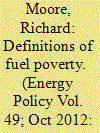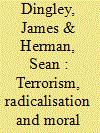|
|
|
Sort Order |
|
|
|
Items / Page
|
|
|
|
|
|
|
| Srl | Item |
| 1 |
ID:
115626


|
|
|
|
|
| Publication |
2012.
|
| Summary/Abstract |
This paper outlines why the definition of fuel poverty is important in policy formulation and describes how the Government's current definitions evolved from the original concept. It discusses the determination of income and fuel costs and the possibilities for a relative and common European measure. It examines problems inherent in assessing fuel costs as a percentage of income and puts forward the arguments for a 'budget standard' approach. The paper illustrates how the size of the problem depends on the definition and chosen threshold and suggests advantages for a rating scale. It illustrates how the income composition and thresholds also govern the distribution of the target populations and the relative importance of the main causal factors, and examines the consequent policy implications. It explores the definition of vulnerable households and the importance of severity and questions whether the UK fuel poverty strategy is targeted at households least able to afford their fuel costs (as the name implies) or primarily those at risk from excess winter and summer mortality and morbidity. Finally, after examining the role of supplementary indicators, it looks at the opportunities for changing the definition and comments on the Government review of the definition and targets.
|
|
|
|
|
|
|
|
|
|
|
|
|
|
|
|
| 2 |
ID:
131252


|
|
|
|
|
| Publication |
2014.
|
| Summary/Abstract |
Despite considerable efforts, the concept of the 'mercenary' remains ill-defined within the scholarly literature on non-state combatants. In common usage, 'mercenary' is intended to function as a descriptive category of combatant, denoting certain unique or transhistorical properties. Instead, however, it is a highly subjective, imprecise and politicized term. This article critically analyses historical, legal and philosophical definitions of 'mercenary', and asks whether it is worth retaining the term as an analytical category at all. In short, the answer is no. The article's exposition of the 'mercenary moniker' uncovers the statist political ethic that anchors different interpretations of the mercenary concept. It shows that conceptions of the mercenary are deeply rooted in a Westphalian political ethic of war and conflict that upholds the instrumentality of the state to notions of political community, morality and identity. Accordingly, it argues that 'mercenary' should be jettisoned from the academic conceptual vocabulary of non-state combatants, and proposes 'freelance militant' as an alternative. Properly contextualized, this alternative could make possible a conceptual vocabulary that is able to clearly distinguish between such freelance militants and other non-state combatants.
|
|
|
|
|
|
|
|
|
|
|
|
|
|
|
|
| 3 |
ID:
158961


|
|
|
|
|
| Summary/Abstract |
Radicalism or radicalisation has become a serious political and academic theme in recent years and any incident involving Muslims now almost automatically acquires the cachet, as events in 2016 and 2017 have shown. However, despite vast sums and resources expended on the subject no one can define what they mean by ‘it’. This should make us pause and question what precisely it is that causes so much alarm and is it worth the resources, time and effort employed to respond to it?
|
|
|
|
|
|
|
|
|
|
|
|
|
|
|
|
| 4 |
ID:
138782


|
|
|
|
|
| Summary/Abstract |
Researchers increasingly conduct quantitative studies of terrorist groups, which is an important advance in the literature. However, there has been little discussion of what constitutes a “terrorist group,” regarding conceptualization or measurement. Many studies of terrorist groups do not define the term, and among those that do, definitions vary considerably. The lack of clarity leads to conceptual confusion as well as sample selection issues, which can affect inferences. To address these issues, this article offers an in-depth analysis of the term and its use. It explores definitions in the literature, and then discusses different samples used. Empirically, the article demonstrates how sample selection can affect variable values. It also shows that a non-representative sample, such as the U.S. Foreign Terrorist Organization list, can lead to inaccurate generalizations. Ultimately, I present a straightforward “inclusive” definition, and argue for its practicality. Other suggestions are made for a more effective and cohesive research program.
|
|
|
|
|
|
|
|
|
|
|
|
|
|
|
|
|
|
|
|
|